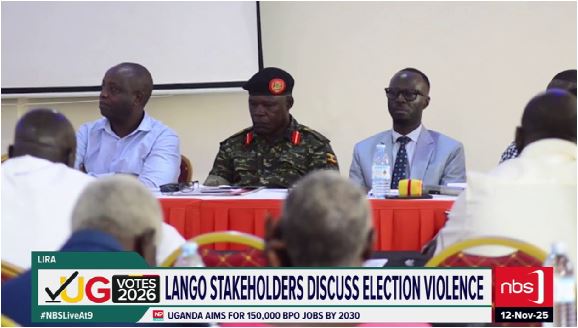The Netherlands Institute for Multiparty Democracy (NIMD) has identified Lira City, Oyam, and Dokolo Districts as potential hotspots for election-related violence ahead of the 2026 general elections, attributing the risks to youth unemployment, political manipulation, and the increasing partisan involvement of cultural and religious leaders.
Speaking during a stakeholders’ dialogue in Lira City, David Mugara, the NIMD Programmes Manager, said the findings stem from a Conflict Situation Analysis Report conducted between May and August this year across Uganda.
The study mapped out electoral hotspots and examined key triggers and drivers of conflict during and after elections.
“For Lango, we found that Lira City, Oyam, and Dokolo were among the key hotspots,” Mugara said.
“Unemployment stood out very profoundly, especially among young people. Many are idle on the streets, engaged in drug and substance abuse, and are easily recruited by political actors to spread propaganda and division, which fuels tension and sometimes violence.”
He added that the growing involvement of cultural and religious leaders in partisan politics has weakened their traditional role as custodians of unity and moral values.
“These institutions were once the moral fabric of society,” Mugara noted. “But by taking political sides, they divide their audiences and escalate tensions that could lead to violence if not mitigated.”
Mugara also warned that the monetisation of elections—now a widespread trend across Uganda—remains a major driver of conflict. He said incumbents often deploy state resources and hire vigilante groups or kanyamas to secure their positions, resulting in intimidation and frequent clashes involving rival groups and security forces.
To prevent potential conflicts, NIMD is engaging cultural leaders, security officials, and the media in dialogues aimed at strengthening peaceful political participation.
“We are calling on Ugandans to speak peacefully and focus on the future of this country,” Mugara said. “We hope that by the end of this process, we will have commitments from key actors to use their platforms responsibly and neutrally.”
During the dialogue, elders from Lango made passionate appeals for moral renewal, civic education, and selfless leadership as key ingredients for reducing electoral violence.
Vincent Isaac Oling, an elder, lamented what he described as a growing culture of greed and selfishness among political actors.
“I find myself almost with nothing to say, as both a beneficiary and a victim of what we call democracy in our situation,” Oling said. “We have resorted to greed and selfishness. Those who come to politics claim to be saviors but are driven by self-interest—by hook or crook they must go through. That is where violence and lawlessness come in.”
He urged leaders and citizens to respect the rule of law and exercise moral restraint.
“There are situations where those who should enforce the law use it to oppress,” he said. “We must remember that God exists and will hold us accountable for every malpractice. Let us treat our neighbors as ourselves and act in the interest of everybody, not for self-gain.”
Julius Peter Odwe emphasized the need for continuous civic education and early preparation for elections. He likened Uganda’s democratic growth to stages of schooling—primary, secondary, and tertiary—arguing that the country is in a “tertiary stage” but still lacks adequate civic awareness.
“If we are to have proper governance in Uganda, we must address these gaps,” Odwe said. “Political leaders, campaign agents, and civil servants must all be aware of the law. Unfortunately, some either ignore it or don’t understand it. Where is civic education? We need it now more than ever.”
Odwe, who has participated in Uganda’s political processes since 1961, called for collaboration across districts and institutions to sustain peace and good governance.
“I live in Dokolo, and I don’t see much problem there because we talk to people,” he said. “But those who lead us should not lead with arrogance or lies. We must act now to close the gaps before it’s too late.”
Dialogue for Peace Ahead of 2026
The dialogue—part of NIMD’s peace and democracy programme—brought together cultural leaders, elders, security officials, and media practitioners to discuss practical steps for mitigating electoral violence and promoting peaceful, inclusive political participation in Lango ahead of the 2026 polls.


